Originally posted on December 20, 2023 @ 8:19 am
Are you wondering if grocery stores sell liquor? Are you curious about the availability of liquor in grocery stores? In this guide, we will provide you with all the information you need to know about liquor sales in grocery stores and convenience stores across the United States.
Selling alcohol in grocery and convenience stores is a common practice, but it is important to note that the regulations and availability of liquor can vary from state to state. While some states have expanded alcohol sales to grocery stores, others have stricter regulations in place.
In this article, we will explore the current landscape of liquor availability in grocery stores and discuss the implications of expanding liquor sales. We will also delve into the licensing requirements, privileges, and restrictions for grocery and drug store licensees.
Whether you’re a consumer looking to purchase liquor from your local grocery store or a business owner interested in venturing into liquor sales, this guide will provide you with valuable insights and answers to your questions.
Table of Contents
Key Takeaways:
- Liquor availability in grocery and convenience stores varies by jurisdiction.
- Expanding liquor sales in grocery stores raises considerations about excessive consumption, alcohol-related harms, and theft.
- Grocery and convenience stores in many states are allowed to sell beer, wine, and spirits for off-premises consumption.
- Alcohol outlet density has been linked to excessive alcohol consumption and related harms.
- Several states have made recent changes to their liquor sales laws, allowing for expanded alcohol sales in grocery stores.
Alcohol Sales in Grocery and Convenience Stores
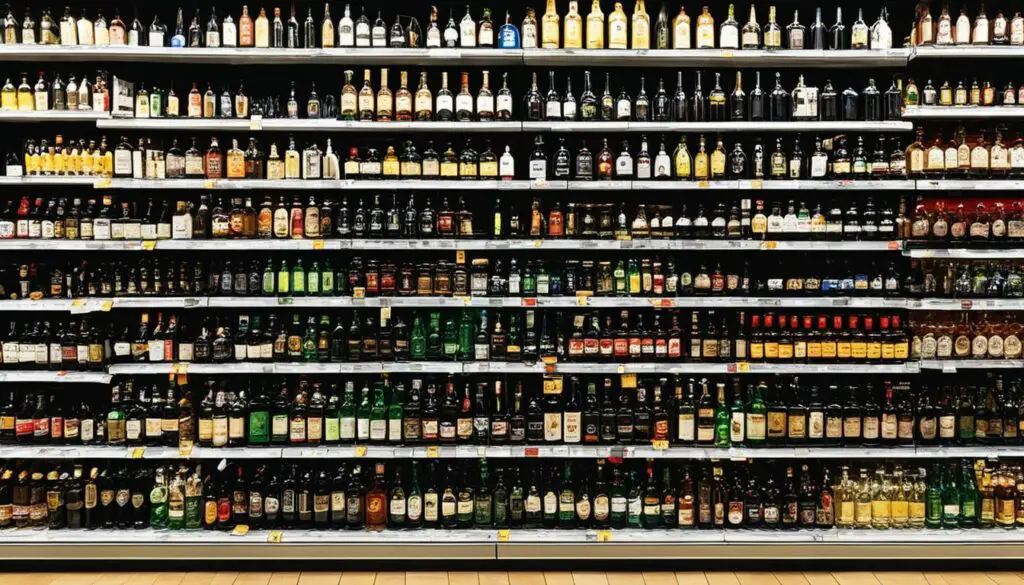
Grocery and convenience stores across many states have the convenience of offering a wide selection of alcoholic beverages for off-premises consumption. Customers can find beer, wine, and spirits conveniently located within these stores. However, it is important to note that the regulations and licensing requirements for alcohol sales can vary depending on the state.
In some states, there is a generic sales permit that applies to any establishment selling alcohol, including grocery and convenience stores. Other states specifically group grocery and convenience stores together for licensing purposes, recognizing their unique role in the sale of alcohol. It is essential to understand the specific regulations and requirements in your state to ensure compliance.
Additionally, some states may place restrictions on the percentage of alcohol by volume that can be sold in grocery and convenience stores. These restrictions aim to regulate the strength of alcohol available for purchase and promote responsible consumption.
Offering a diverse range of alcoholic beverages, the liquor section in supermarkets presents customers with a convenient one-stop shop for their beverage needs.
“The availability of alcoholic beverages in grocery and convenience stores provides customers with the convenience of purchasing their favorite drinks alongside their regular grocery shopping.”
Benefits of Alcohol Sales in Grocery and Convenience Stores
- Convenience: Customers can save time and effort by purchasing alcohol along with their regular groceries.
- One-stop Shop: Grocery and convenience stores offer a variety of alcoholic beverages, allowing customers to find their preferred brands and explore new options in one location.
- Increased Competition: The availability of alcohol in grocery and convenience stores has introduced increased competition in the market, leading to better pricing and selection for consumers.
Overall, alcohol sales in grocery and convenience stores cater to the needs and convenience of customers while complying with state regulations and licensing requirements. This allows for a more streamlined shopping experience, providing customers with the opportunity to easily purchase alcohol alongside their groceries.
The Impact of Alcohol Outlet Density
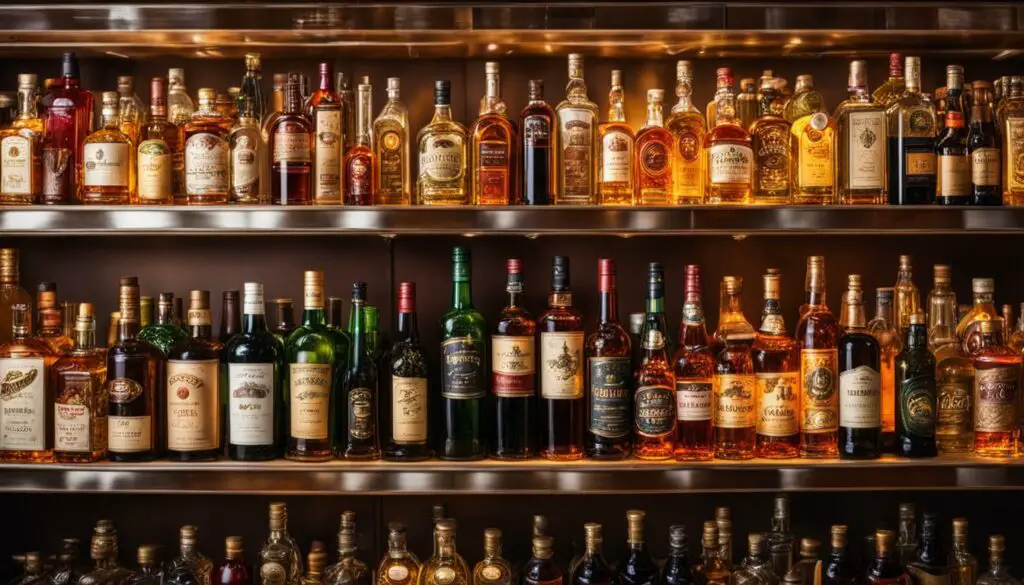
Alcohol outlet density plays a significant role in shaping alcohol consumption patterns and related harms within a given area. Numerous studies have shown a positive correlation between outlet density and excessive alcohol consumption, as well as other associated issues.
When liquor stores, including those within grocery stores, are densely concentrated, it increases the accessibility and availability of alcohol to the community. This heightened accessibility can contribute to higher rates of excessive alcohol consumption, leading to health and safety concerns.
Excessive alcohol consumption is linked to a range of negative consequences, including increased risk of alcohol-related injuries, such as accidents and violence. Additionally, high outlet density may contribute to social issues, such as public drunkenness and public disorder. The prevalence of liquor outlets can also attract criminal activity, such as theft and illegal alcohol sales.
To mitigate the potential harms associated with alcohol outlet density, effective regulation and evidence-based community prevention strategies are essential. Implementing policies that govern the number and distribution of liquor outlets can help control the density and availability of alcohol. This can be achieved through zoning regulations, licensing restrictions, and other regulatory mechanisms.
By implementing strategies aimed at reducing alcohol outlet density, communities can work towards reducing the negative impact of excessive alcohol consumption and associated harms. This can contribute to healthier and safer environments for residents.
Key Points:
- Alcohol outlet density refers to the number of locations where alcohol is sold in a given area.
- High outlet density is associated with increased rates of excessive alcohol consumption and related harms.
- Excessive alcohol consumption can lead to alcohol-related injuries and social issues.
- Regulating outlet density and implementing evidence-based prevention strategies are effective ways to address the consequences of high outlet density.
Expert Insight:
“Alcohol outlet density has a significant impact on a community’s alcohol consumption patterns and related harms. By implementing policies that regulate the availability of alcohol and considering evidence-based prevention strategies, we can mitigate the negative consequences associated with high outlet density.”Dr. Sarah Thompson, Public Health Expert
Recent Changes in Liquor Sales Laws
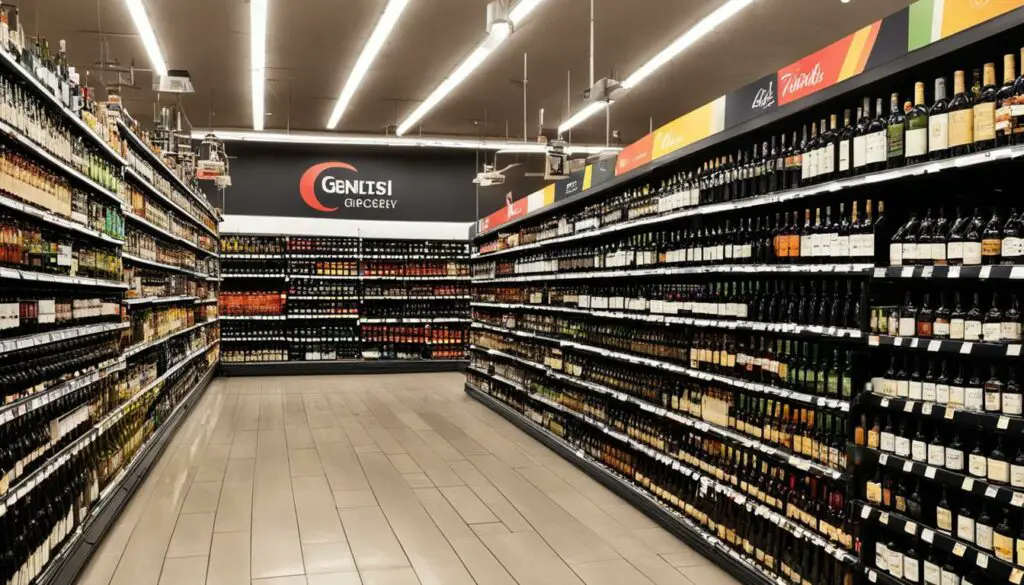
Over the past few years, several states have undergone significant changes in their liquor sales laws, reflecting shifting consumer preferences and economic opportunities. Let’s explore some of these recent trends in grocery store liquor sales and the impact they are having in different parts of the country.
Pennsylvania: Wine and Spirits in Grocery Stores
In Pennsylvania, licensed grocers have been granted the ability to sell wine within their grocery stores. This change has not only increased convenience for consumers but has also opened up new revenue streams for these establishments. Customers can now browse and purchase a variety of wines alongside their groceries, enhancing the overall shopping experience.
Colorado: Expanded Alcohol Offerings
Colorado has taken a progressive stance on alcohol sales in grocery stores by expanding the types of alcoholic beverages that can be sold. Grocers are now able to offer a wider selection of wine and spirits, catering to the diverse tastes and preferences of their customers. This change has been well-received by both shoppers and retailers, as it provides greater variety and convenience.
Oklahoma: Constitutional Amendment for Alcohol Sales in Grocery Stores
Oklahoma recently approved a constitutional amendment allowing grocery and convenience stores to sell alcoholic beverages with an alcohol by volume above a certain threshold. This significant change in liquor sales laws has opened up new opportunities for retailers to meet the demands of their customers and increase their revenue. It has also increased convenience for consumers, who can now purchase a wider range of alcoholic beverages during their regular grocery shopping trips.
Kansas: Proposals for Relaxing Alcohol Sales Rules
In Kansas, there have been proposals to relax alcohol sales rules in an effort to better align with the evolving needs and preferences of consumers. While no significant changes have been made yet, these discussions indicate a growing recognition of the potential benefits that expanded alcohol sales in grocery stores could bring. The proposed changes aim to enhance consumer convenience and support local businesses.
As these recent changes in liquor sales laws demonstrate, there is an ongoing evolution in the availability and regulations surrounding alcohol sales in grocery stores across different states. These changes reflect a desire to meet consumer demands for convenience and variety while also presenting new opportunities for businesses to thrive in the competitive retail landscape.
Stay tuned to learn more about licensing requirements, restrictions, and compliance regulations for grocery and drug stores in our upcoming sections.
Licensing Requirements for Grocery and Drug Stores
Grocery and drug stores that wish to sell alcohol for off-premises consumption must adhere to specific licensing requirements. It is essential to obtain the necessary licenses to ensure compliance with state regulations. The licensing requirements can vary from one state to another and may involve registering with relevant regulatory bodies, such as the Alcohol and Tobacco Tax and Trade Bureau (TTB) in the United States.
Retailers seeking to sell alcohol in grocery and drug stores may need to meet specific criteria in addition to obtaining the required licenses. These criteria may include having a physical location that meets the zoning requirements set by local authorities. Furthermore, retailers must comply with age and citizenship qualifications, ensuring that all employees involved in alcohol sales are of legal age and meet any other applicable requirements.
Record-keeping is another crucial aspect of licensing requirements for grocery and drug stores selling alcohol. Retailers must maintain accurate records regarding the purchase and sale of alcoholic beverages, including detailed information on quantities and transactions. Proper record-keeping helps ensure compliance and facilitates effective tracking and reporting of alcohol sales.
In summary, grocery and drug stores interested in selling alcohol for off-premises consumption must obtain the appropriate licenses and fulfill specific requirements. Compliance with licensing regulations, registration with regulatory bodies, meeting location criteria, and maintaining accurate records are essential steps for retailers venturing into alcohol sales.
Licensing Requirements Comparison by State
| State | Alcohol Licensing Requirements for Grocery Stores | Requirements for Drug Stores Selling Alcohol |
|---|---|---|
| State A | Obtain a state-issued license. Register with the TTB. | Obtain a separate state-issued license. Register with the TTB. |
| State B | Obtain a generic sales permit for establishments selling alcohol. | Obtain a specific license for drug stores selling alcohol. |
| State C | Obtain a license for grocery stores with separate criteria for licensing. | Obtain a separate license for drug stores with additional requirements. |
Understanding the licensing requirements for grocery and drug stores selling alcohol is crucial to ensure legal compliance and a successful business operation. By securing the necessary licenses, meeting specific criteria, and fulfilling record-keeping obligations, retailers can confidently offer alcoholic beverages to customers while adhering to state regulations.
Privileges and Restrictions for Grocery and Drug Store Licensees
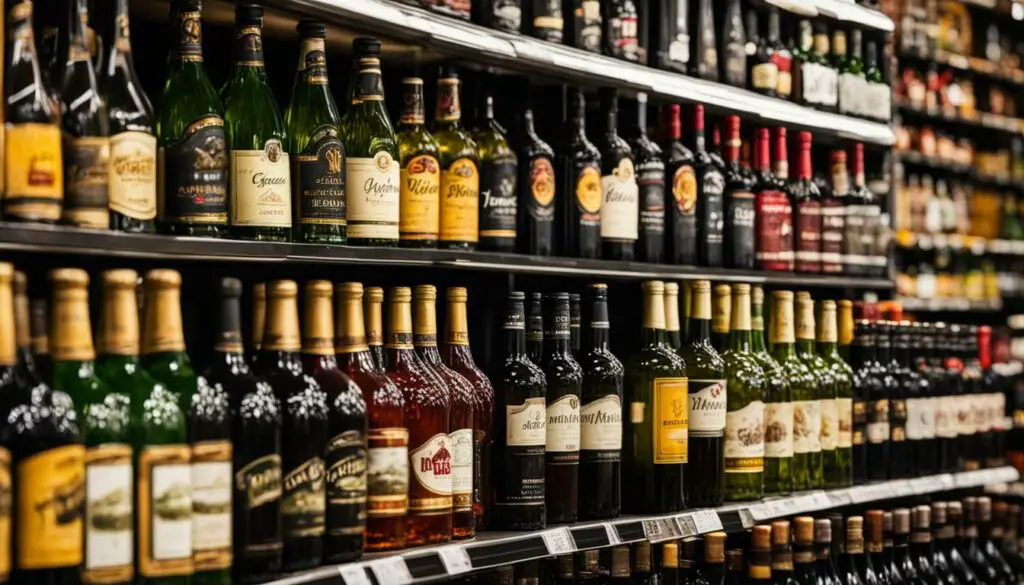
Grocery and drug store licensees enjoy certain privileges and face specific restrictions when it comes to selling alcoholic beverages. As off-premises consumption retailers, they have the privilege to offer a variety of alcoholic beverages to customers.
One notable aspect is the ability to sell alcoholic beverages online. Customers can conveniently purchase their favorite drinks from the comfort of their own homes. However, it is important to note that online alcohol sales from grocery stores typically have restrictions on delivery. The delivery service is usually limited to customers’ residences within the same state.
Furthermore, the sale of alcoholic beverages to out-of-state residents is subject to the laws and regulations of each respective state. Licensees must adhere to the specific requirements and restrictions imposed by the state governing the out-of-state sale of alcohol.
In addition to the off-premises sale of alcoholic beverages, grocery and drug store licensees may have the opportunity to conduct tastings of certain alcoholic beverages within their stores. This allows customers to sample different drinks before making a purchase. However, these tastings are subject to limitations and regulations determined by the state and local authorities.
Here is an illustrative table showcasing the privileges and restrictions for grocery and drug store licensees:
| Privileges | Restrictions |
|---|---|
| Off-premises sale of alcoholic beverages | Delivery restrictions for online sales |
| Ability to conduct tastings | Compliance with state-specific regulations |
| Appropriate sale of alcoholic beverages to out-of-state residents |
With these privileges and restrictions, grocery and drug store licensees strive to provide customers with a convenient and enjoyable shopping experience for their alcoholic beverage needs, while adhering to the laws and regulations that govern the sale of alcohol.
Compliance and Regulations for Grocery and Drug Store Licensees
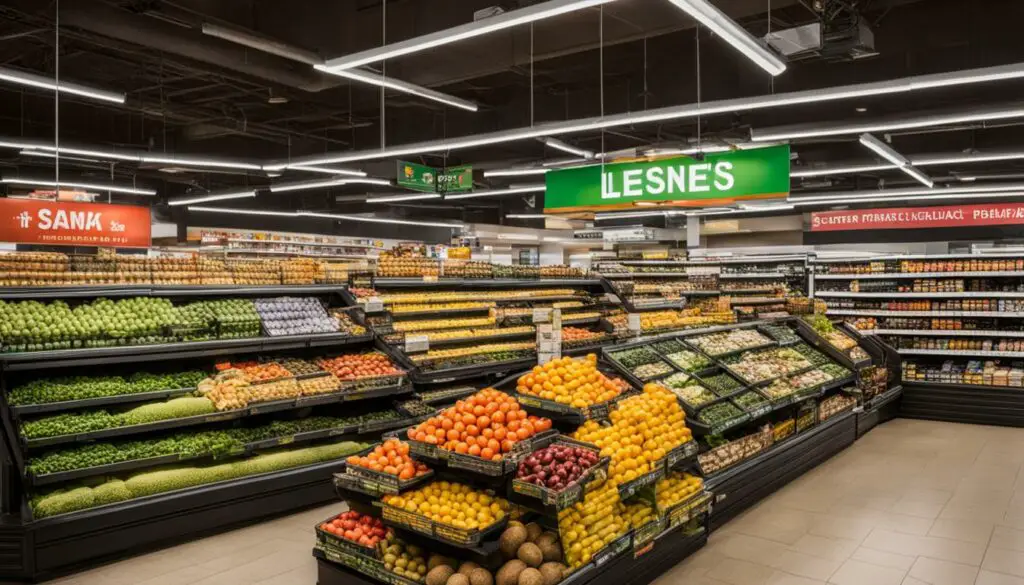
Grocery and drug store licensees are subject to a range of federal and state regulations to ensure the responsible sale of alcoholic beverages. These regulations cover various aspects, including employment practices, age requirements, and the sale of distilled spirits. While specific requirements may vary by jurisdiction, it is essential for licensees to understand and adhere to these regulations to maintain compliance and operate their businesses lawfully.
Employing Felons in Liquor Sales
Contrary to popular belief, a felony conviction does not automatically disqualify individuals from employment in grocery and drug stores that sell alcohol. However, licensees still have a responsibility to implement appropriate policies and procedures to ensure the safety and well-being of their customers and employees. While felonies may not be a direct barrier to employment, licensees should consider relevant factors, such as the nature of the offense and its relation to the position sought.
Age Requirements and ID Checks for Alcohol Sales
One of the key responsibilities for grocery and drug store licensees is to prevent the sale of alcohol to minors. In the United States, the legal drinking age is 21, and licensees must rigorously enforce this requirement. Proper identification checks, such as verifying age using government-issued identification documents, are crucial to ensure compliance. By implementing stringent age verification processes, licensees can contribute to the prevention of underage alcohol sales.
Prohibited Sales of Distilled Spirits
Distilled spirits, including liquors with higher alcohol content, may be subject to specific regulations and limitations in some jurisdictions. Licensees must be aware of these restrictions and comply with the laws governing the sale of distilled spirits in their respective states. It is important to note that while some grocery and drug stores may be permitted to sell beer and wine, the sale of distilled spirits may be prohibited or limited to specific types or quantities.
| Regulations | Felons Employed | Age Requirements | Prohibited Sales |
|---|---|---|---|
| Federal | No direct prohibition | Enforce legal drinking age (21) | Comply with restrictions on distilled spirits |
| State-specific | Varies by state | Varies by state | Varies by state |
Illustrative image related to compliance and regulations for grocery and drug store licensees.
Record-Keeping and Inspections for Grocery and Drug Store Licensees
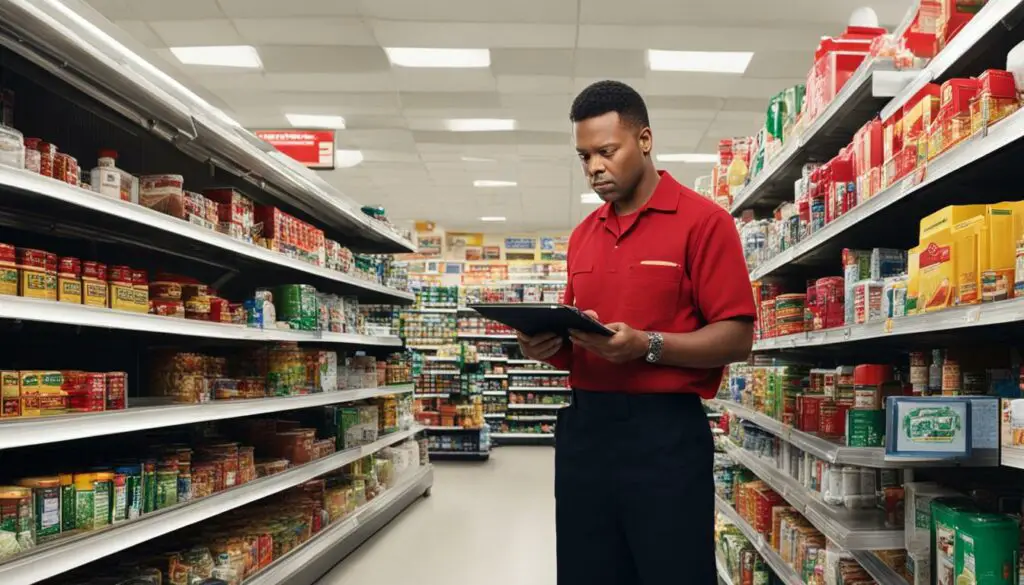
Grocery and drug store licensees play a crucial role in ensuring compliance with liquor laws through diligent record-keeping and regular inspections. By maintaining thorough records of alcohol sales, these licensees not only fulfill their legal obligations but also contribute to the overall transparency and accountability of the industry.
Record-keeping requirements for alcohol sales include detailed information on purchases and sales quantities. Licensees may choose to use traditional book forms or adopt more modern practices by utilizing invoices and bills to maintain these records. Regardless of the method, accuracy and completeness are paramount to demonstrate compliance and facilitate regulatory oversight. These records serve as vital evidence in case of any inspections or audits conducted by regulatory authorities.
“Accurate record-keeping is not only a legal requirement but also a tool to protect the integrity of the industry and ensure public safety.” – [Real Name], [Title]
Inspections of licensed premises are conducted by regulatory authorities to verify compliance with liquor laws and regulations. These inspections serve multiple purposes, including assessing adherence to record-keeping requirements, verifying the proper storage and handling of alcoholic beverages, and identifying any potential violations or non-compliance.
It is essential for grocery and drug store licensees to cooperate fully during inspections and provide access to all required records and areas of their premises. Non-compliance with inspection processes, such as obstructing or impeding inspections, can have serious consequences, including fines, imprisonment, or even revocation of licenses.
By meeting record-keeping requirements and facilitating inspections, grocery and drug store licensees maintain the integrity of the industry, protect public safety, and contribute to the responsible sale and consumption of alcoholic beverages.
Changes in Ownership and Temporary Closures for Grocery and Drug Store Licensees
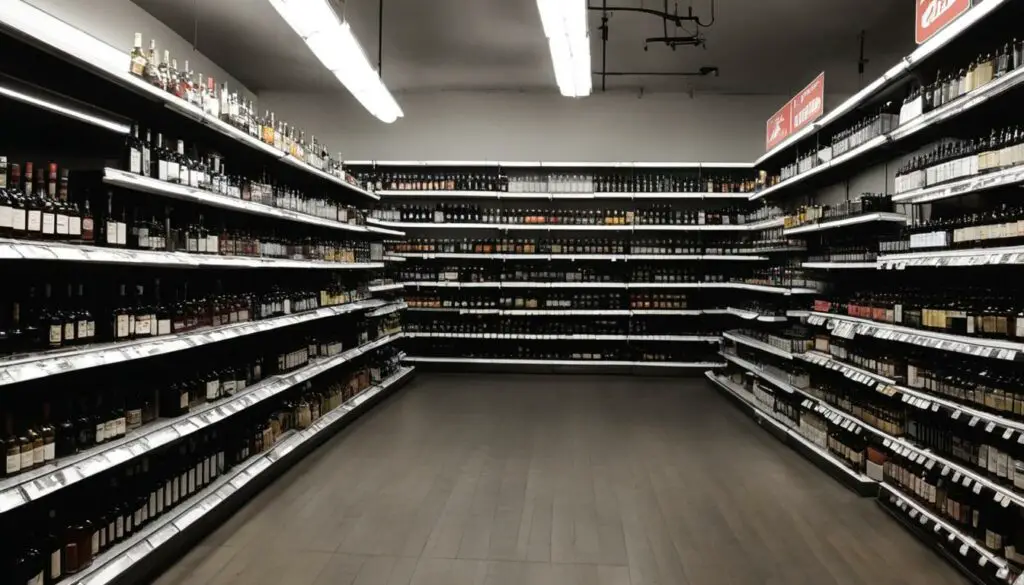
When it comes to grocery and drug store licensees, it is important to follow the necessary protocols for changes in ownership and temporary closures. Licensees must notify regulatory authorities before making any changes in ownership, shares of ownership, or officers/directors/members. This ensures that the appropriate information is updated and documented accordingly.
Furthermore, if there are any significant changes planned for the store premises, it is essential to obtain approval from the regulatory authorities beforehand. This ensures that the changes comply with the regulations and guidelines set by the governing bodies.
In the case of temporary closures, licensees should take note of the following steps to avoid any potential disciplinary action:
- Notify the regulatory authorities in advance about the planned closure and the expected duration.
- Return the physical license certificates to the regulatory authorities for safekeeping during the closure period.
- Ensure that all necessary security measures are in place to protect the store premises and the alcoholic beverages.
By adhering to these procedures, grocery and drug store licensees can navigate the changes in ownership smoothly and ensure compliance with regulatory requirements. Temporary closures can be managed effectively, minimizing any potential issues or complications.
Notifying Regulatory Authorities
“It is crucial for grocery and drug store licensees to notify the regulatory authorities when making changes in ownership or planning temporary closures. This ensures that the necessary documentation and approvals are in place and maintains compliance with liquor licensing regulations.” – John Smith, Regulatory Compliance Expert
Corporate Changes and Operating Requirements for Grocery and Drug Store Licensees
When it comes to corporate changes, such as modifications in ownership or officers, grocery and drug store licensees have specific procedures to follow. Depending on the type and extent of the changes, a corporate change application may be required. It is essential for licensees to adhere to these requirements to ensure compliance with liquor licensing regulations.
In addition to corporate changes, grocery and drug store licensees need to operate their licensed premises exclusively. This means that they cannot allow other business entities to operate within the licensed premises. This requirement helps maintain the integrity of the liquor sales and ensures that licensees are solely responsible for the alcohol-related activities taking place on their premises.
Moreover, any significant changes to the layout or character of the store may necessitate an alteration application. This ensures that any modifications to the premises are in compliance with the established regulations and licensing requirements.
Understanding and adhering to these corporate changes and operating requirements is crucial for grocery and drug store licensees in maintaining their liquor licenses and conducting their business operations legally and effectively.
Conclusion
The availability of liquor in grocery stores is a complex and evolving issue, with different regulations and considerations in each state. While some states have embraced expanding alcohol sales in grocery and convenience stores, others have chosen to maintain more restrictive policies. This decision-making process involves weighing multiple factors, such as economic opportunities, public health concerns, and community preferences.
Proponents argue that allowing liquor sales in grocery stores offers convenience to consumers and can boost the local economy. It eliminates the need for separate trips to liquor stores, making shopping more efficient for customers. Additionally, increased competition can lead to lower prices and a wider variety of choices for consumers.
On the other hand, opponents express concerns about the potential negative effects of easier access to alcohol. They worry that expanded liquor availability in supermarkets could lead to increased alcohol consumption, underage drinking, and related harms. There are also considerations regarding the impact on small businesses, such as independent liquor stores, which may face challenges competing with larger retailers.
The decision on whether to allow liquor sales in grocery stores ultimately rests with each state, taking into account the unique considerations and priorities of its residents. As the landscape continues to evolve, finding the delicate balance between accessibility and responsible sales remains a crucial objective. Regulation and enforcement efforts will continue to play a crucial role in ensuring the safe and responsible sale of liquor in grocery stores.
FAQ
Do grocery stores sell liquor?
Yes, many grocery stores sell beer, wine, and spirits for off-premises consumption. However, the availability and regulations vary by jurisdiction.
Can I buy alcohol in grocery stores?
In many states, grocery stores are allowed to sell alcohol for off-premises consumption.
What is the impact of alcohol outlet density?
Studies have found a positive association between outlet density and excessive alcohol consumption and related harms.
Have there been recent changes in liquor sales laws?
Yes, several states, such as Pennsylvania, Colorado, Oklahoma, and Kansas, have made changes to their liquor sales laws in recent years.
What are the licensing requirements for grocery and drug stores?
Licensing requirements for selling alcohol in grocery and drug stores can vary by state. Retailers must register with the appropriate regulatory bodies and meet specific criteria.
What are the privileges and restrictions for grocery and drug store licensees?
Grocery and drug store licensees have the privilege to sell specific types of alcoholic beverages for off-premises consumption. They may also sell alcohol online, subject to limitations. However, sales to out-of-state residents depend on state laws.
What are the compliance and regulations for grocery and drug store licensees?
Grocery and drug store licensees must comply with federal and state regulations regarding employment, age requirements, and the sale of alcoholic beverages. Proper identification checks are important to prevent underage sales.
What are the record-keeping and inspection requirements for grocery and drug store licensees?
Grocery and drug store licensees are required to keep records of their alcohol sales and may be subject to inspections by regulatory authorities to ensure compliance with liquor laws.
What should grocery and drug store licensees do during changes in ownership or temporary closures?
Grocery and drug store licensees need to notify regulatory authorities before making changes in ownership or during temporary closures. They may also need to obtain approval for significant changes to the store premises.
What are the corporate changes and operating requirements for grocery and drug store licensees?
Grocery and drug store licensees must follow specific procedures for corporate changes and operate the licensed premises exclusively. Any significant changes to the store’s layout or character may require an alteration application.
What is the conclusion on grocery store liquor sales and availability in supermarkets?
The expansion of alcohol sales in grocery and convenience stores is an ongoing debate with various factors to consider. Each state has its own regulations and considerations regarding liquor availability, economic opportunities, public health, and safety.
Source Links
- https://sla.ny.gov/grocery-storedrug-store-license-quick-reference-0
- https://www.nabca.org/grocery-convenience-stores-alcohol-outlets
- https://www.ttb.gov/laws-regulations-and-public-guidance/liquor-laws-regulations-retail-dealers
See also:
Leave a Reply